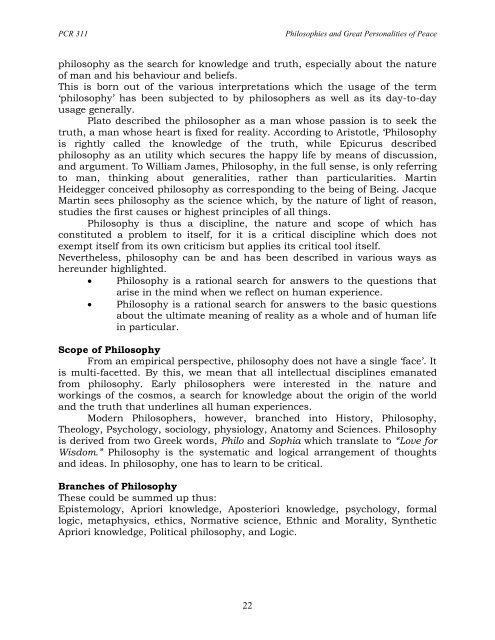pcr 311 - National Open University of Nigeria
pcr 311 - National Open University of Nigeria
pcr 311 - National Open University of Nigeria
You also want an ePaper? Increase the reach of your titles
YUMPU automatically turns print PDFs into web optimized ePapers that Google loves.
PCR <strong>311</strong> Philosophies and Great Personalities <strong>of</strong> Peace<br />
philosophy as the search for knowledge and truth, especially about the nature<br />
<strong>of</strong> man and his behaviour and beliefs.<br />
This is born out <strong>of</strong> the various interpretations which the usage <strong>of</strong> the term<br />
‘philosophy’ has been subjected to by philosophers as well as its day-to-day<br />
usage generally.<br />
Plato described the philosopher as a man whose passion is to seek the<br />
truth, a man whose heart is fixed for reality. According to Aristotle, ‘Philosophy<br />
is rightly called the knowledge <strong>of</strong> the truth, while Epicurus described<br />
philosophy as an utility which secures the happy life by means <strong>of</strong> discussion,<br />
and argument. To William James, Philosophy, in the full sense, is only referring<br />
to man, thinking about generalities, rather than particularities. Martin<br />
Heidegger conceived philosophy as corresponding to the being <strong>of</strong> Being. Jacque<br />
Martin sees philosophy as the science which, by the nature <strong>of</strong> light <strong>of</strong> reason,<br />
studies the first causes or highest principles <strong>of</strong> all things.<br />
Philosophy is thus a discipline, the nature and scope <strong>of</strong> which has<br />
constituted a problem to itself, for it is a critical discipline which does not<br />
exempt itself from its own criticism but applies its critical tool itself.<br />
Nevertheless, philosophy can be and has been described in various ways as<br />
hereunder highlighted.<br />
• Philosophy is a rational search for answers to the questions that<br />
arise in the mind when we reflect on human experience.<br />
• Philosophy is a rational search for answers to the basic questions<br />
about the ultimate meaning <strong>of</strong> reality as a whole and <strong>of</strong> human life<br />
in particular.<br />
Scope <strong>of</strong> Philosophy<br />
From an empirical perspective, philosophy does not have a single ‘face’. It<br />
is multi-facetted. By this, we mean that all intellectual disciplines emanated<br />
from philosophy. Early philosophers were interested in the nature and<br />
workings <strong>of</strong> the cosmos, a search for knowledge about the origin <strong>of</strong> the world<br />
and the truth that underlines all human experiences.<br />
Modern Philosophers, however, branched into History, Philosophy,<br />
Theology, Psychology, sociology, physiology, Anatomy and Sciences. Philosophy<br />
is derived from two Greek words, Philo and Sophia which translate to “Love for<br />
Wisdom.” Philosophy is the systematic and logical arrangement <strong>of</strong> thoughts<br />
and ideas. In philosophy, one has to learn to be critical.<br />
Branches <strong>of</strong> Philosophy<br />
These could be summed up thus:<br />
Epistemology, Apriori knowledge, Aposteriori knowledge, psychology, formal<br />
logic, metaphysics, ethics, Normative science, Ethnic and Morality, Synthetic<br />
Apriori knowledge, Political philosophy, and Logic.<br />
22

















